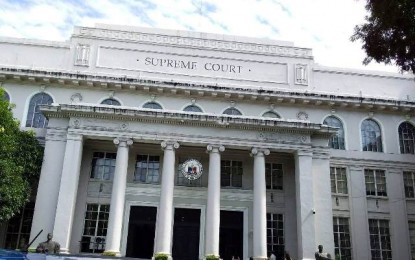
Supreme Court (File photo)
MANILA – The Supreme Court (SC) on Tuesday assured prompt action and fairness on cases falling under its newly approved rules for refugees and stateless persons.
Every case that reaches the Supreme Court will be treated with “absolute liberality”, Chief Justice Alexander Gesmundo told visiting United Nations High Commissioner for Refugees (UNHCR) dignitaries.
“The Philippines, historically, is welcoming of refugees,” Gesmundo said during the meeting with the UNHCR delegation composed of Aurvasi Patel, lawyer Maria Ermina Valdeavilla-Gallardo, and Maria Louella Gamboa, senior protection associate of UNHCR-Philippines.
Patel lauded the SC rules, calling it “a good showcase” as she stressed that the Philippine judiciary “stands out” following its recent promulgation of the rules.
“We are really appreciative of what you have done. It is a fantastic illustration of progressive thinking,” Patel said during the meeting.
The UNHCR, on its website, acknowledged the welcoming trait of the Philippines as it noted the country’s open-door immigration policy in 1934 during the time of President Manuel L. Quezon, who helped Jewish refugees escape Nazi persecution by giving them sanctuary.
Gesmundo discussed the rules approved on February 15 that simplified procedures and reduce legal and procedural hurdles.
The SC en banc said the rules underscore the Philippines’ commitment under international law, particularly the 1951 Convention Relating to the Status of Refugees, 1967 Protocol Relating to the Status of Refugees, 1954 Convention Relating to the Status of Stateless Persons, and 1961 Convention on the Reduction of Statelessness.
The new SC rules, among other things, allow for electronic publication.
Under Section 12, if the court is satisfied that the petition is sufficient in form and substance, it shall direct the Clerk of Court to cause the publication of the petition, excluding its annexes, for three consecutive weeks in the Official Gazette or its website; in one newspaper of general circulation or its website; or in the SC official website.
The SC said the measure “is with due regard to the special and vulnerable circumstances of refugees and stateless persons, such that the alternative modes of publication would reduce the necessary fees and be less burdensome for them”.
The rule also allows an unaccompanied child to file a petition for naturalization filed on the child’s behalf by the Department of Social Welfare and Development, appropriate Local Social Welfare and Development Office where the unaccompanied child resides or the caring agency that has custody of the child.
The new rules put into fruition the goal of the judiciary to “provide affordable and effective means of attaining justice” by introducing judicial reforms or streamlining court rules to ensure an efficient, fair, and speedy delivery of justice, the SC stated. (PNA)
